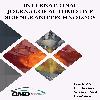The Effect of Adding EN (2-Ethylhexyl Nitrate) to Diesel-Ethanol Blends on Performance and Exhaust Emissions
The Effect of Adding EN (2-Ethylhexyl Nitrate) to Diesel-Ethanol Blends on Performance and Exhaust Emissions
In this study, effect of EN addition to diesel-ethanol blends as cetane improver were examined with regard to performance parameters such as brake torque, brake power, fuel consumption, brake specific fuel consumption and exhaust emissions such as NOx, CO, CO2 in a four-cylinder, water-cooled diesel engine. Firstly, an ethanol-diesel blend represented as E10 were prepared by mixing 10% of ethanol with 90% of diesel fuel as volume. Then other blends symbolized as E10EN2 (10% ethanol, 2% EN and 88% diesel), E10EN4 (10% ethanol, 4% EN and 86% diesel) and E10EN6 (10% ethanol, 6% EN and 84% diesel) were created by mixing ethanol-diesel-EN to get information about the behavior of EN. The results obtained for these blends at five different engine speed under full load condition were compared with E10 and 100% diesel fuel. It was found that EN addition raised the cetane number by 5%, 11%, 16% for E10EN2, E10EN4 and E10EN6 compared to E10 whereas EN caused a slight decrease in kinematic viscosity, lower heating value and a slight increase in density. It was also deduced that EN addition had a reducing effect on NOx, CO emissions and brake power while it had an increasing effect on CO2 emission and brake specific fuel consumption.
Keywords:
Alternative Fuel Diesel, Ethanol, Engine Performance,
___
- Ickes, A.M., Bohac, S.V., and Assanis, D.N., "Effect of 2-Ethylhexyl Nitrate Cetane Improver on NOx Emissions from Premixed Low-Temperature Diesel Combustion", Energy & Fuels, 23, 4943-4948, 2009.
- Yayın Aralığı: Yılda 4 Sayı
- Başlangıç: 2016
- Yayıncı: Otomotiv Mühendisleri Derneği
Sayıdaki Diğer Makaleler
Experimental comparison of different injection timings in an HCCI engine fueled with n-heptane
Seyfi POLAT, H. Serdar YÜCESU, Kaushik KANNAN, Ahmet UYUMAZ, Hamit SOLMAZ, Mahdi SHAHBAKHTHİ
Ahmet Uyumaz, Fatih AKSOY, Fahrettin BOZ, Emre Yılmaz
Design Verification of Tractor Clutch Cover under High Centrifugal Effect
